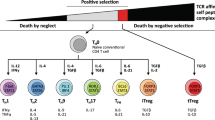Abstract
CD8+ cytotoxic T-lymphocytes are major effector cells involved in immunologically specific tumor destruction in vivo, and CD4+ T-cells are essential for controlling this CD8+ T-cell-dependent tumor eradication. The presence of CD4+ T-cells with distinct functional roles has been recognized. The further understanding of the complexity of antitumor immune responses by CD4+ T-cells may be crucial for designing more effective cancer vaccines.
Similar content being viewed by others
References
Hung K, Hayashi R, Lafond-Walker A, Lowenstein C, Pardoll D, Levitsky H.The central role of CD4+ T cells in the antitumor immune response.J Exp Med. 1998;188:2357–2368.
Toes RE, Ossendorp F, Offringa R, Melief CJ. CD4 T cells and their role in antitumor immune responses.J Exp Med. 1999;189: 753–756.
Cohen PA, Peng L, Plautz GE, Kim JA, Weng DE, Shu S. CD4+ T cells in adoptive immunotherapy and the indirect mechanism of tumor rejection.Crit Rev Immunol. 2000;20:17–56.
Rosenberg SA, Yang JC, Schwartzentruber DJ, et al. Immunologic and therapeutic evaluation of a synthetic peptide vaccine for the treatment of patients with metastatic melanoma.Nat Med. 1998;4: 321–327.
Greenberg PD. Adoptive T cell therapy of tumors: mechanisms operative in the recognition and elimination of tumor cells.Adv Immunol. 1991;49:281–355.
Buller RM, Holmes KL, Hugin A, Frederickson TN, Morse HC 3rd. Induction of cytotoxic T-cell responses in vivo in the absence of CD4 helper cells.Nature. 1987;328:77–79.
Rahemtulla A, Fung-Leung WP, Schilham MW, et al. Normal development and function of CD8+ cells but markedly decreased helper-cell activity in mice lacking CD4.Nature. 1991;353:180–184.
Wang B, Norbury CC, Greenwood R, Bennink JR, Yewdell JW, Frelinger JH. Multiple paths for activation of naive CD8+ T cells: CD4-independent help.J Immunol. 2001;167:1283–1289.
Mintern JD, Davey GM, Belz GT, Carbone FR, Heath WR. Precursor frequency affects the helper dependence of cytotoxic T cells.J Immunol. 2002;168:977–980.
Franco A, Tilly DA, Gramaglia I, et al. Epitope affinity for MHC class 1 determines helper requirement for CTL priming.Nat Immunol. 2000;1:145–150.
Diehl L, Boer AT, Schoenberger SP, et al. CD40 activation in vivo overcomes peptide-induced peripheral cytotoxic T-lymphocyte tolerance and augments anti-tumor vaccine efficacy.Nat Med. 1999;5:774–779.
Schoenberger SP, Toes RE, van der Voort EL, Offringa R, Melief CJ. T-cell help for cytotoxic T lymphocytes is mediated by CD40-CD40L interactions.Nature. 1998;393:480–483.
Bennett SR, Carbone FR, Karamalis F, Flavell RA, Miller JF. Help for cytotoxic-T-cell responses is mediated by CD40 signaling.Nature. 1998;393:478–480.
Ridge JP, Di Rosa F, Matzinger P. A conditioned dendritic cell can be a temporal bridge between a CD4+ T-helper and a T-killer cell.Nature. 1998;393:474–478.
Banchereau J, Steinman RM. Dendritic cells and the control of immunity.Nature. 1998;392:245–252.
Casares N, Lasarte JJ, de Cerio AL, et al. Immunization with a tumor-associated CTL epitope plus a tumor-related or unrelated Th1 helper peptide elicits protective CTL immunity.Eur J Immunol. 2001;31:1780–1789.
Morel PA, Oriss TB. Crossregulation between Th1 and Th2 cells.Crit Rev Immunol. 1998;18:275–303.
Nishimura TK, Iwakabe M, Sekimoto Y, et al. Distinct role of antigen-specific T helper type 1 (Th1) and Th2 cells in tumor eradication in vivo. JExp Med. 1999;190:617–627.
Fallarino F, Grohmann U, Bianchi R, Vacca C, Foretti MC, Puccett P. Th1 andTh2 cell clones to a poorly immunogenic tumor anti- gen initiate CD8+ T cell-dependent tumor eradication in vivo.J Immunol. 2000;165:5495–5501.
Sakaguchi S, Sakaguchi N, Asano M, Itod M, Toda M. Immunologic self-tolerance maintained by activated T cells expressing IL-2 receptor a-chains (CD25): breakdown of a single mechanism of self-tolerance causes various autoimmune diseases.J Immunol. 1995;155:1151–1164.
Shimizu J, Yamazaki S, Sakaguchi S. Induction of tumor immunity by removing CD4+ CD25+ T cells: a common basis between tumor immunity and autoimmunity.J Immunol. 1999;163:5211–5218.
Onizuka S, Tawara I, Shimizu J, Sakaguchi S, Fujita T, Nakayama E. Tumor rejection by in vivo administration of anti-CD25 (interleukin-2 receptora) monoclonal antibody.Cancer Res. 1999;59:3128–3133.
Author information
Authors and Affiliations
Corresponding author
About this article
Cite this article
Shiku, H. Importance of CD4+ Helper T-cells in Antitumor Immunity. Int J Hematol 77, 435–438 (2003). https://doi.org/10.1007/BF02986610
Received:
Accepted:
Published:
Issue Date:
DOI: https://doi.org/10.1007/BF02986610




